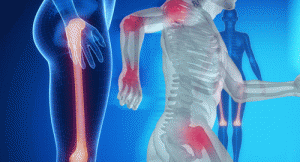 Women with postmenopausal bone loss also have increased levels of inflammatory cytokines in the bone marrow. This finding has led researchers to suggest that postmenopausal osteoporosis may appropriately be characterized as an inflammatory condition. Studies have also found that individuals with reduced taxonomic diversity of the gut microbiome are more likely to have inflammatory and/or metabolic disease.
Women with postmenopausal bone loss also have increased levels of inflammatory cytokines in the bone marrow. This finding has led researchers to suggest that postmenopausal osteoporosis may appropriately be characterized as an inflammatory condition. Studies have also found that individuals with reduced taxonomic diversity of the gut microbiome are more likely to have inflammatory and/or metabolic disease.
Together, this research has led investigators to successfully improve bone health by changing the gut microbiome with probiotics. The mechanisms behind the effectiveness of probiotics are, however, still not well understood. One suggestion is that, although in healthy individuals the resident flora of the gut lumen are separated from systemic tissue compartments by the intestinal epithelial, dysbiosis results in increased gut permeability, which leads to inflammation and pathology. If this is true, then probiotics that decrease gut permeability may be useful in the prevention of postmenopausal osteoporosis.
Jau-Yi Li, PhD, instructor of medicine at Emory University in Atlanta, and colleagues published the results of their investigation of this hypothesis on April 25 in The Journal of Clinical Investigation.1 They analyzed biochemical and histomorphometric indices of bone turnover in mice following 10 weeks of treatment with the gondadotropin-releasing hormone (GnRH) agonist Lupron Depot. Their study included mice raised in normal housing, as well as mice raised in germ-free conditions.
“We report that sex steroid depletion increases gut permeability and the production of osteoclastogenic cytokines in the intestine and the bone marrow,” write the authors in their discussion. “Mice housed in germ-free conditions are protected against intestinal and bone marrow inflammatory responses and the loss of trabecular bone induced by sex steroid deficiency. We also show that treatment with probiotics prevents the increase in gut permeability, the production of intestinal and bone marrow cytokines, and the bone loss induced by sex steroid depletion.”
Thus, the investigators found that the mice with sex steroid deficiency had altered cytokine levels in the bone marrow, as well as the small intestine. They proposed that these altered cytokines influence response to the gut luminal microbiota and, thus, play a pivotal role in inducing inflammation and bone loss in the Lupron Depot treated mice. They further suggested that TNFα is the key mediator in this interaction.
In an accompanying editorial, Jameel Iqbal, MS, PhD, associate scientist and senior fellow at the Icahn School of Medicine at Mount Sinai, N.Y., and colleagues cautioned that the interaction is likely to extend beyond TNFα.2
